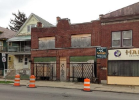CRE Development Strategies and Practice

Published February 7, 2023
The School of Architecture and Planning’s Master of Real Estate Development program (MSRED) is one of only a few programs in the U.S. offering interdisciplinary studies of real estate development with architecture and urban planning. UB's MSRED program offers a course in commercial real estate (CRE) development strategies and practices as a capstone to the program. In the Fall 2021 capstone course, students pulled together knowledge that they learned throughout the three-semester program. The course enabled students to pursue their personal career interests by acting as an industry developer building their own CRE project
Students researched the current dynamics impacting CRE development and acting in teams and drafted business plans that focused their personal interests with current CRE market conditions. Following the goals laid out in their team’s building plan, each team then identified a real-world CRE development project that met their goals. The feasibility of the development project was then assessed through a market and financial analysis. During the analysis phase, students presented their findings to the class for input, and were given the opportunity to reach out to industry professionals and program alumni working in CRE development, financing and marketing. This experience included in-person guest lectures as well as the use of remote learning tools, allowing students to engage with professionals from different parts of the country and broaden the scope of input.
The teams of students focused on both traditional and innovative forms of real estate development with their own personal CRE development strategies. Student motives included interests in providing affordable housing, community focus, trending financial dynamics, and more traditional topics of redevelopment for financial return.
At the conclusion of the semester, students presented their development to a panel of professional and alumni "investors." They were granted a limited amount of money to invest in the projects that they felt met their personal goals for development. As some of the teams had a focus on an investor’s return, other teams focused on projects that had a higher social return. The result of the panelists' allocation of their limited dollars showed students that today’s investors are financially focused on feasible projects, but also on perhaps accepting a slightly less financial return if a community benefit could also be achieved. This at times resulted in a project that had a large social driver and less financial return as the most desirable investment. This helped break the stigma that investors only have concerns about financial gains.
Students
Marc Ayala, Evan Scales (Micro Fulfillment), Sean Cook, Pamela Jackson (Changing the Narrative)
Faculty
Jeffery LiPuma
Term
END 593, Fall 2021
Program
MSRED



